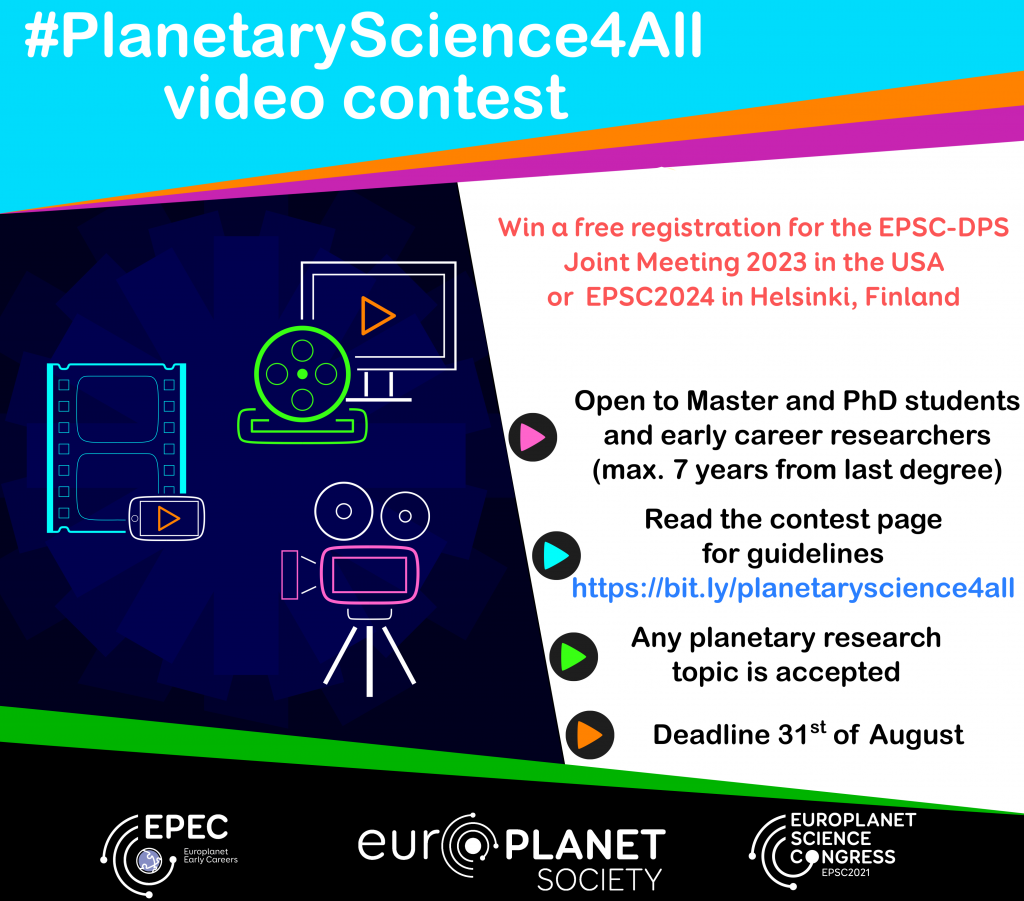PlanetaryScience4All EPEC-EPSC 4-minute video contest: Call for PhD students and early career researchers
The Europlanet Early Career (EPEC) Communication working group gives all early career researchers, including PhD, Master’s and Bachelor’s students, involved in planetary science projects the opportunity to showcase their research in the 3rd edition of the 4-minute video contest called #PlanetaryScience4All.
Winner of the #PlanetaryScience4All EPEC-EPSC Video Contest 2022
’29P & Comet Chasers’ by Cai Stoddard-Jones
About the #PlanetaryScience4All EPEC-EPSC Video Contest 2022
- The 4-minute videos should be submitted as a link via the entry form.
- The deadline will be 31st of August 2022.
- If you have any questions about the #PlanetaryScience4All video contest, please contact epec.communications@gmail.com.
- Download the flyer.

#PlanetaryScience4All challenges PhD, Master’s and Bachelor’s students to explain their research project to a general public audience in just 4 minutes. The videos will be judged on scientific content, communication skills and creativity.
The winner of the competition will receive free registration and travel grant for the EPSC-DPS Joint Meeting 2023, which will be held in Sab Antonio, Texas, USA, in 2023 or EPSC2024 In Helsinki, Finland. The winning video will be also shared via the Europlanet website, newsletters and social media. It will also be used to inspire young people in future EPEC outreach activities.
Entries are welcome for all planetary science related topics (atmosphere, surfaces, models, analogues, simulations, etc.) applied to any planetary bodies (planets, asteroids, comets, meteorites, exoplanets).
#PlanetaryScience4All video contest FAQ
- Who can enter?
- Is there a specific topic or subject area?
- Is there an age limit?
- How can I submit the video?
- How long should the video be?
- Is there a file size limit?
- Which file formats will be accepted?
- Are there any specific requirements for the content?
- Are there prizes?
- When is the deadline?
- Who is going to judge the videos?
- Any other guidance?
Who can enter?
The competition is open to all PhD, Master’s and Bachelor’s students as well as early career researchers (last degree obtained a maximum of 7 years ago, excluding parental leave, serious illness and similar delays) working in planetary science or related fields.
Is there a specific topic or subject area?
There is no specific topic. All research topics related to planetary science are welcome (planets, asteroids, comets, meteorites, astrobiology, analogue missions, space instrumentation etc.).
Is there an age limit?
The competition is open to all Masters/PhD students and early career researchers with no age limit.
How can I submit the video?
To enter the contest, fill in the application form. In the form, you will be asked to submit a link to your video and tell us a bit about yourself and your research. Make sure that the link to your video is working and is accessible to external people or your submission will not be evaluated.
How long should the video be?
The video must be a maximum of 4 minutes long. Longer videos will not be eligible. Shorter videos may be evaluated if the quality of the video content is high. We strongly recommend using all the time you have to explain your work as best as you can. The videos may be shared in Europlanet and EPEC outreach activities aimed at the general public and schools.
Is there a file size limit?
There is no file size limit. However, full HD videos of 3 to 4 minutes are usually around 60–120 MBs, so we suggest that you don’t exceed this size range. Remember that compression can reduce the size and quality of the resulting file.
Which file formats will be accepted?
The most common formats are .AVI and .MP4. The videos will be shared via Europlanet social media channels so we recommend that you use a format accepted by the majority of platforms.
Here a useful link: https://sproutsocial.com/insights/social-media-video-specs-guide/#facebook
Are there any specific requirements for the content?
The video must be about your own research. If you are using illustrations that you have not created yourself you MUST check that you have the necessary permissions and that you give the correct credits for all images, graphs, videos, figures etc.
Since the time is limited, make sure you are focused and plan your time well. For example, you might want to use 30 seconds to introduce yourself, 1 minute to introduce your research, 1 minute for general results, 1 minute for conclusions and the last 30 seconds to say what you are going to do next. However, there is no fixed template, so be creative!
Choose a good title to make your video stand out.
You can use whatever device you have available to record your video – your phone, laptop, a camera… it’s up to you. An easy method is to use a video-conferencing service (like Zoom) with you as the sole participant, but you may find other creative solutions. And unlike a live presentation, you have the chance for multiple “takes” before sending us your video! You can edit, adapt and add as many (or few) effects as you wish.
Are there prizes?
The winner of the competition will receive free registration and a travel grant for the DPS-EPSC Joint Meeting 2023 in San Antonio, Texas, or EPSC2024 in Helsinki. The winning video will be highlighted on the Europlanet website and social media channels.
When is the deadline?
The submission deadline for videos is 31st of August 2022. Late submissions will not be accepted.
Who is going to judge the videos?
The judging process will be in three steps. In Step 1, the EPEC Communication Working Group members will evaluate the submissions according to the following criteria: scientific content, presentation delivery, structure, layout and visual effects quality. In Step 2, a panel of judges made up of EPEC network members and science communicators will be asked select two finalists. In Step 3, the EPSC 2021 Executive Committee will be asked to select the winner. The winner will be announced at the end of the virtual meeting by the EPEC Communication Working Group Co-Chairs.
Any other guidance?
We want to give as much freedom as possible to all participants to find their own way of sharing their research. Drawing, animations, Lego videos, sharing presentations… Be creative! Any format is welcome, so long as it demonstrates your communication skills.
Resources
- Watch the videos entered for the 2020 edition of the #PlanetaryScienceForAll contest
- Read the #PlanetaryScience4All 2020 Report
- Find out more about the activities of the EPEC Communications Working Group


